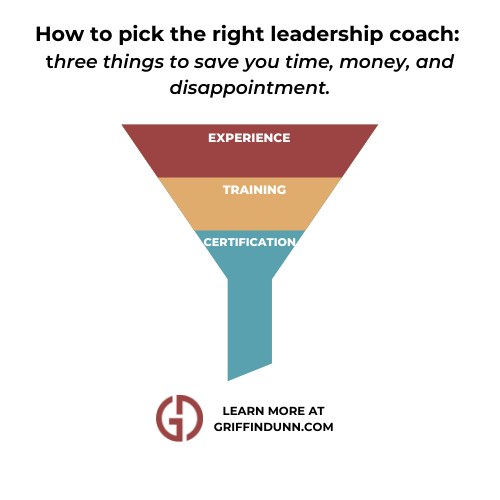How to pick the right leadership coach (act II)
Is a coach just a coach? How do I choose the right one for me?
This is the second of a three-part series of articles that will help clarify and simplify your decision, and to make sure you don’t make a bad choice.
In our previous article, we took a deep look at how to evaluate the experience level of a potential coach. This article will go deeper into how to assess a potential coach’s training.
As a quick reminder: There are three major criteria to evaluate and weigh according to your unique situation:
Experience, Training, and Certification.
The three most important criteria for picking a leadership coach: experience, training, and certification
Let’s dive deeper into the second criteria: Training.
Choose a leadership coach whose training gives you confidence they know what’s what.
There are hundreds of training courses out there specific to coaching, there are even more training opportunities with implications for coaching. As the Client, you can, and should, ask what training your potential coach has received and from what institution they received it.
Google is a wonderful place to check the school out and decide whether that coach’s training will help you in what could be a life-changing experience.
Second Criteria: Training.
There are three Training Factors that are critical for you to consider.
Training Factor 1: Specific Coach Training
Coaching is rising in popularity. While once a benefit and privilege to the likes of CEOs and Founders, it is being seen more and more as a key element in Leadership development. Coaches are in demand; and when demand goes up, the supply grows to meet the demand.
There are over 500 organizations offering training, and the number is growing all the time. Some have been around for decades, others for days. All coaches need some level of training. Becoming a coach isn’t just a matter of adding the title to your business card, but the quality of the training is what matters to you as the Client.
First, an important caveat: There are enumerable courses offered online to become a coach. All of these vary vastly in their effectiveness. Coaching is an interactive sport requiring two-way dialogue between the coach and the Client. Obviously, reading and interacting with a series of pages on the internet can only yield so much knowledge of the practice of coaching. Here the final and most critical learning, actually coaching, will be at the expense of the first few years of the newly minted “coach’s” Clients.
With that out of the way, I’ll share three of the most common types of Specific Coach Training.
Type 1: School-Specific Certifications
There are coaching intensives that offer school-specific certifications in coaching. These run the gambit from one to 4-day events with coach faculty teaching the principles of coaching but focusing on the techniques. Some of these offer actual labs where the practice of coaching can be learned as well. Coaches that enter these programs already experienced in some level of coaching can gain some of the theory behind the practice. Some examples of these include the Life Coach Institute, Work Life Destinations, and Expert Ranking.
Type 2: Universities
Universities are offering certification and degree programs in coaching. Not surprisingly these institutions tend to lean heavily on the theoretical and philosophical underpinnings of the “science” of coaching. Things like Neuropsychology, somatic, and other mind/body effects are at the forefront. Sometimes this is combined with actual experience in pro bono experiences for the students to learn in actual coaching workshops and Client sessions. These are emerging avenues for coach training and vary tremendously in the curriculum at this point. Some examples of these include the University of the Cumberlands and Arizona State University.
Type 3: Coaching Organizations
Organizations like the International Coaching Federation (ICF), the International Association of Coaching (IAC), and the International Authority for Professional Coaching and Mentoring (IAPC&M) are working to raise the bar and set the standards for this burgeoning industry. They provide credentialing of courseware and processes for the courses taught to achieve certification. While they each have unique aspects with regard to their philosophy of coaching, their accredited schools are reviewed and assessed as to the quality of their instruction against an objective set of standards.
The courseware generally has a combination of “book learning” and practicum that makes them unique. Some require not only the courseware to be completed but also a dictated amount of hours for the student to be awarded a certification of professional achievement. A great example is Coach Training World. (full disclosure, this is my alma mater) This school is fully accredited, focused on both the theory and practice of high-quality coaching, and is very supportive of their students before, during, and after the thorough training they provide.
In general, the ICF is considered the most rigorous and the “gold standard” for coach certification. This training and certification are required by major corporations and institutions with coaching programs for leadership development.
I will address the coaching professional accreditations in the final article of this series: certification.
Training Factor 2: Informal Training
Not every person who wants to become a coach can afford the thousands of dollars and years of commitment and time necessary to complete formal training. Maybe they are HR professionals who performed training or assessments that led to spectacular results in their organization. Maybe they are a consultant who blurred the lines between coaching and consulting in their work as an advisor. Perhaps they just have a love for the work of helping others succeed and have voraciously read everything in the world of literature on the subject.
If this is the case, referrals are essential in evaluating your potential coach. Some questions you might want to ask of your potential coach if they fall into this category are:
What outcomes did they bring about for their Clients?
Was their approach based on inquiry assuming their Clients possess the tools and knowledge to heavily create the outcome or was the approach more that of an advisor telling the Client what to do?
Training Factor 3: Training Tools
There are specific tools that coaches use to help their Clients succeed or help the coach to help them. If there is a specific technique that you would like to participate in with your coach such as Clifton Strengths, a DISC analysis, or Enneagram, for example, these require special training over and above the coach training illustrated above.
Specific training on these tools helps coaches assess the results professionally and accurately. An ethical coach will refer you to a trained professional in these specific techniques if they lack the training.
Some questions for you to consider asking your potential coach if you are interested in specific tools:
Is your coach committed to ongoing training?
What are they learning now?
How are they growing to help you more?
In summary, some questions. Why did your coach get the education they did? Was it to practice a well-paid job or to understand the impact of changing Clients’ lives for the better? To help make them the best they can be. I love C.S. Lewis in general, but I dearly love his quote on education: “Education without values, as useful as it is, seems rather to make ‘a person’ a more clever devil.”
As you apply these four training filters your leadership coach candidate pool will shink to reveal the ones that are the best Training fit for you.
Download the Training Criteria Checklist
There is one more set of criteria to evaluate your future leadership coach: Certification. We’ll explore that last area in our next article.
Dan Bartholomew, ICF-PCC, WPCC, is an Executive and Leadership Coach who helps teams and leaders navigate their careers 🛶. With decades of experience running, building, and scaling businesses, Dan is centered on enabling individuals and teams to achieve and sustain breakthrough performance -- personally and organizationally.
As Eric Schmidt, former CEO and current strategic advisor to Google said “everyone needs a coach.” Let’s work together to get you one!




